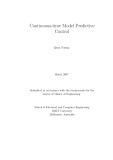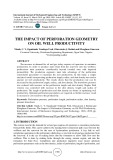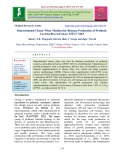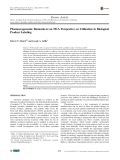
Optimizing well productivity
-
Model Predictive Control (MPC) refers to a class of algorithms that optimize the future behavior of the plant subject to operational constraints. The merits of the class algorithms include its ability to handle imposed hard constraints on the system and perform on-line optimization. This thesis investigates design and implementation of continuous time model predictive control using Laguerre polynomials and extends the design approaches proposed in to include intermittent predictive control, as well as to include the case of the nonlinear predictive control.
 162p
162p  runthenight07
runthenight07
 01-03-2023
01-03-2023
 9
9
 4
4
 Download
Download
-
In this study, a simple analytical model incorporating perforation length, radius, and shot density was used to analyze oil well productivity. The results shows that the production rate can be increased by the perforation length, radius, and shot density.
 10p
10p  lucastanguyen
lucastanguyen
 01-06-2020
01-06-2020
 25
25
 4
4
 Download
Download
-
Deproteinated cheese whey was used for biomass production of probiotic strain Lactobacillus helveticus MTCC 5463 in a biofermenter. Optimization of growth parameters such as temperature, pH and time of incubation as well as nutrient supplementation of cheese whey was carried out using response surface methodology (RSM). Cheese whey supplemented with 0.95% yeast extract and 0.95% proteose peptone, inoculated with 6% (v/v) active culture of L. helveticus MTCC 5463 and fermented for 24 h at optimized temperature of 40ºC and pH 6.25 yielded 3.25 g/L dry cell biomass and 14.
 14p
14p  chauchaungayxua6
chauchaungayxua6
 26-06-2020
26-06-2020
 28
28
 3
3
 Download
Download
-
Precision medicine promises to improve both the efficacy and safety of therapeutic products by better informing why some patients respond well to a drug, and some experience adverse reactions, while others do not. Pharmacogenomics is a key component of precision medicine and can be utilized to select optimal doses for patients, more precisely identify individuals who will respond to a treatment and avoid serious drug-related toxicities.
 5p
5p  caothientrangnguyen
caothientrangnguyen
 09-05-2020
09-05-2020
 13
13
 2
2
 Download
Download
-
Only 2% of the known natural products with acetylenic bonds area-alkynoates. Their polarized, conjugated triple bond is an optimal target for an enzymic hydration. Therefore they are good substrates for the enzymes involved in metabolism of acetylenic compounds, resulting in products that are suitable for bacterial growth. We isolated a Pseudomonas putida strain growing on 2-butynedioate as well as on propynoate, and determined the metabolic pathways of these two a-alkynoates.
 6p
6p  tumor12
tumor12
 20-04-2013
20-04-2013
 29
29
 1
1
 Download
Download














